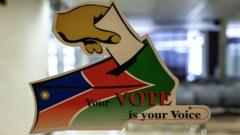This year's elections across sub-Saharan Africa have seen significant gains for opposition parties, putting pressure on traditionally dominant governments amid rising public discontent over corruption and economic issues.
Shifting Political Landscapes: Opposition Gains in Sub-Saharan Africa

Shifting Political Landscapes: Opposition Gains in Sub-Saharan Africa
Despite long-standing governance, African ruling parties face a wave of electoral challenges, signaling a new era of opposition strength.
In a stunning shift in Africa's political arena, ruling parties are experiencing unprecedented electoral setbacks as opposition groups gain ground in various countries. After over 30 years of leadership, Namibia's governing party, Swapo, managed to secure the presidency with 57% of the votes, propelling Netumbo Nandi-Ndaitwah to the historic role of the nation’s first female leader. However, opposition parties have challenged the election results, citing logistical failures and irregularities despite Swapo’s deteriorating parliamentary performance.
The year 2024 has proven to be particularly harsh for sub-Saharan governments, many of which have struggled under the weight of voter dissatisfaction. In Botswana, the ruling Botswana Democratic Party (BDP) suffered a humiliating defeat, going from a prior stronghold with 38 parliamentary seats to a mere four, marking a dramatic shift in the political landscape. Similarly, Mauritius experienced a staggering political overhaul as the opposition Alliance du Changement captured a sweeping 60 seats, reducing the ruling coalition led by Prime Minister Pravind Jagnauth to just two.
Senegal also witnessed an opposition triumph, with the release of key opposition figures bolstering their campaign against President Macky Sall. The political scene in South Africa provides yet another example of erosion in voter confidence, as the African National Congress (ANC) barely held onto power, marking its first drop below 50% of the national vote since 1994.
Catalysts for this turbulent year include rampant corruption and economic mismanagement, which have stoked public anger. Citizens across the region united against the heavy burden of rising living costs exacerbated by inflation. The momentum generated by youth-led protests in Kenya highlighted this growing discontent, resembling a global trend seen in places like the UK and the United States.
Opposition parties have adapted strategically, forming coalitions and ensuring electoral processes are closely monitored, which has proved vital in garnering public trust and votes. As Ghana approaches its elections, there remain concerns over its New Patriotic Party’s (NPP) stability, reflecting wider regional anxieties.
The resilience of African democracies is increasingly noted against a backdrop of global political decline, demonstrating that civil society, engaged citizens, and a proactive opposition can effectively hold governments accountable. As this year marks a potential turning point, with unprecedented opposition victories, it may signal a new era of political engagement and accountability across sub-Saharan Africa that could influence the global democratic landscape.




















